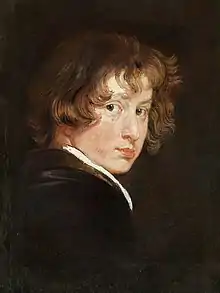Self-portrait (van Dyck, Vienna)
The Self-portrait of 1613–1614 is the first surviving self-portrait by the Flemish artist Anthony van Dyck, showing him aged about fifteen. At that date he was still working for Hendrick van Balen but was about to join Peter Paul Rubens's studio.[1] Self-portraiture was a typical artform in the Northern Renaissance and had already been used by Rubens and Jan van Eyck.
| Self-portrait | |
|---|---|
 | |
| Artist | Anthony van Dyck |
| Year | 1613–1614 |
| Medium | Oil on canvas |
| Dimensions | 25.8 cm × 19.4 cm (10.2 in × 7.6 in) |
| Location | Academy of Fine Arts Vienna |
References
- Christopher Brown, Van Dyck 1599–1641, Milan, RCS Libri, 1999, ISBN 88-17-86060-3, page 94
Bibliography
- Gian Pietro Bellori, Vite de' pittori, scultori e architecti moderni, Torino, Einaudi, 1976.
- Didier Bodart, Van Dyck, Prato, Giunti, 1997.
- Justus Müller Hofstede, Van Dyck, Milan, Rizzoli/Skira, 2004.
- Stefano Zuffi, Il Barocco, Verona, Mondadori, 2004.
- Marco Horak, Van Dyck tra i grandi ritrattisti nelle raccolte piacentine, in "Panorama Musei", anno XVI, no. 2, August 2011
External links
 Media related to Self-Portrait (Anthony van Dyck - Academy of Fine Arts Vienna) at Wikimedia Commons
Media related to Self-Portrait (Anthony van Dyck - Academy of Fine Arts Vienna) at Wikimedia Commons
This article is issued from Wikipedia. The text is licensed under Creative Commons - Attribution - Sharealike. Additional terms may apply for the media files.